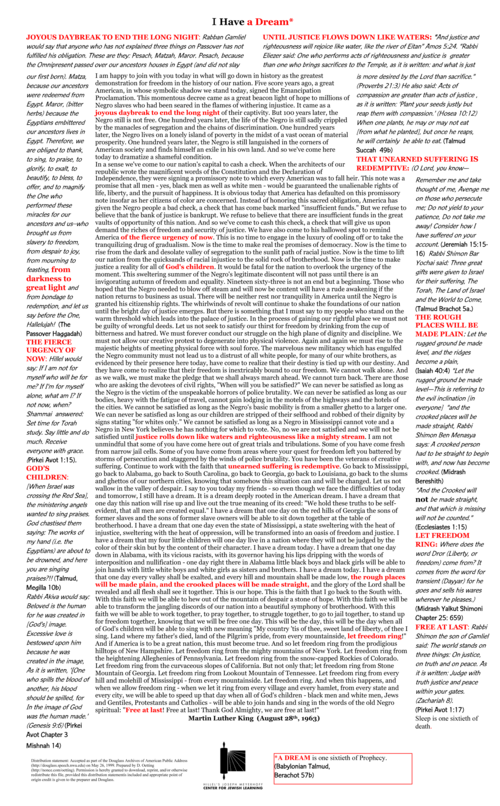What role did religion play in speeches at the March on Washington?
"I Have a Dream..." Talmud Page
"I Have a Dream..." Talmud Page
The “I Have a Dream” Talmud page and the accompanying study guide were prepared by Hillel’s Meyerhoff Center for Jewish Learning Director Rabbi Avi Weinstein for the 2001 Charlotte and Jack J. Spitzer B'nai B'rith Hillel Forum on Public Policy.
Used with permission of Hillel: The Foundation for Jewish Campus Life, hillel.org.
"I Have a Dream..." Talmud Page (For printing)
This version of the Talmud Page is optimized for printing on 11" x 17" paper.
The “I Have a Dream” Talmud page and the accompanying study guide were prepared by Hillel’s Meyerhoff Center for Jewish Learning Director Rabbi Avi Weinstein for the 2001 Charlotte and Jack J. Spitzer B'nai B'rith Hillel Forum on Public Policy.
Used with permission of Hillel: The Foundation for Jewish Campus Life, hillel.org.
Original at www.hillel.org/jewish/textstudies/special/mlk.htm
Discussion Questions - Description
- Review: Who wrote and delivered the "I Have a Dream" speech? When?
- Who was the intended audience for this speech? How do you think this might have influenced the content and tone of this speech?
- Read the text on the center of the page (the original speech) out loud in your group. Based only on this text, and not on other things you've heard about this speech, describe in your own words, what is Martin Luther King's dream?
- It's not surprising that King, a minister, used biblical references in his speech. Many of his listeners may have been aware of these references, but others may not have been aware of the literary complexities of this speech. Which, if any, of these references are familiar to you? What associations do you have with them?
- On the "I Have a Dream" Talmud page, some of the references have been highlighted and explained. Choose 3 of the highlighted phrases and read the commentary in the margin.
- How, if at all, do you interpret or think about this speech differently looking at it today in a Jewish context?
Optional
To further explore the "I Have a Dream…" Talmud Page, use the study guide found at www.hillel.org/NR/rdonlyres/743F812F-0F35-4C72-9268-0A6A4EADF305/0/MLK_Navigator.pdf.
Rabbi Joachim Prinz's Speech at the March on Washington, 1963
Click "About this clip" to read transcript. Retrieved from http://www.joachimprinz.com/civilrights.htm. Permission to use granted by Jonathan Prinz.
Discussion Questions - Description
- African Americans can be seen as having a "hyphenated identity" (black and American—an identity that combines race and nationality). Consider what hyphenated group Rabbi Prinz is speaking as a member of. How does he make it clear that this group is hyphenated?
- According to Rabbi Prinz, why do Jews identify with African Americans?
- How does Rabbi Prinz connect the Civil Rights Movement to the Holocaust?
- What does Rabbi Prinz believe is the "most urgent problem" facing America?
- What does he see as the solution to this problem?
Analysis
After you examine all of the documents in your packet answer the following questions:
- How was the Bible, a text held to be sacred by Jews and Christians alike, used in the speeches given at the March on Washington? How might this have unified and created bonds between diverse marchers? What other effects might this have had?
- Several Jewish leaders were an official presence at the March on Washington. Jewish leadership represented on the platform included Shad Polier of the American Jewish Congress, Rabbi Leon Foyer of the Central Conference of American Rabbis, George Maislan of the United Synagogue of America, Rabbi Joachim Prinz of the American Jewish Congress, and Rabbi Uri Miller of the Synagogue Council of America. Why might these individuals have felt it was important to be there? Why did the organizers of the March feel it was important to include Jewish leadership? What significance do you think the public presence of Jewish leaders might have had on participants and those viewing/listening at home?
- While Rabbi Joachim Prinz seems to have had a message for Jewish participants, how do you think his message may have been received by non-Jewish participants?
- Do you ever feel hyphenated (part of a group with two identities)? Share some of your hyphenated identities with one another. Consider: When do you identify more strongly with the Jewish part of your identity? When do you identify more strongly with the American (or other) part of your identity? When do you identify more strongly with another part of your identity (besides Jewish or American)? What causes might you support as a Jew? What causes might you support as an American? What causes might you support as an…[insert another part of your identity here]?



